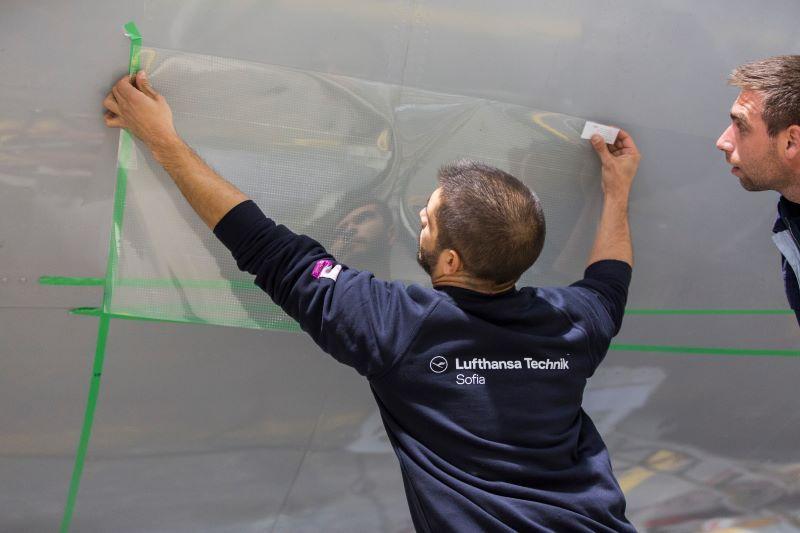
SINGAPORE—Lufthansa Group is looking to have all its aircraft fitted with the Aeroshark riblet film in the future, as subsidiary SWISS is on track to complete the application on all 12 of its Boeing 777-300ERs.
The technology is now being gradually applied on Lufthansa’s 11 777F freighters.
“We want to have it everywhere as we have seen at least 1% and up to 3% efficiency in fuel consumption in future development stages,” says Caroline Drischel, Lufthansa Group head of corporate responsibility.
Developed by Lufthansa Technik and coating specialist BASF, Aeroshark technology is currently certified only on two types of Boeing 777 family aircraft. Drischel says Lufthansa Group has also started developing AeroShark modifications for additional aircraft types, which would subsequently need to pass through their individual certification campaigns.
Speaking at the inaugural Lufthansa regional sustainability event in Singapore, Drischel says the airline is planning to introduce the GreenFare ticketing option for intercontinental flights from Europe to the Asia-Pacific region. Currently only available on European routes, GreenFare allows consumers to automatically subscribe to sustainability efforts, in which part of the fare is used to pay for sustainable aviation fuel (SAF) and climate protection projects.
Without divulging too much, Drischel says it will be rolled out on the airline’s busiest and most profitable routes, and trials will commence as early as this year.
CAPA – Centre for Aviation and OAG Schedules Analyser data shows Lufthansa’s busiest destination to Asia in terms of capacity is Singapore, followed by Incheon, South Korea and Tokyo.
Drischel hints that the group has finalized a portfolio of trusted carbon compensation projects that will include a mix of emission avoidance and carbon removal. The portfolio will be revealed in due course.
She also says it is unlikely the airline will plan its future network based on SAF supply and availability, a theory that was mooted by numerous airports and regulators.
“Today in Europe we only get SAF in Frankfurt, but we still have other airlines [elsewhere in the group]. We use the book-and-claim system that is part of the EU legislation, and we strongly believe this makes a lot of sense for the climate because you don’t have to ship SAF to an airport,” Drischel says.
“We believe this will be the future because a lot of SAF production is happening in countries where they don’t have big airports or a lot of green energy. So, we won’t organize our network to get SAF, but we will use the book-and-claim system that is legally allowed by the European Commission.”
